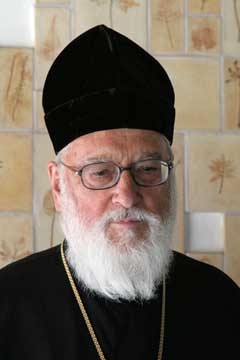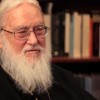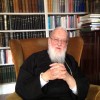 What is the distinctive and unique function of the Church? What is it that the Church alone does and can do? What is it that distinguishes the parish church from everything else — from a mere group of people, a society, a club, an ethnic organization? Surely, the only answer to this question is that that which distinguishes the Church from all else is the Eucharist, the Divine Liturgy, which only the Church does and can do. The Church is a Eucharistic society. It is in the Eucharist that the Church becomes her very self in the unfathomable mystery of the Body and Blood of Christ. The Liturgy maintains the Church in unity, for the unity of the Church is a unity created from within by Holy communion. Herein lies the most central thing of the Church itself.
What is the distinctive and unique function of the Church? What is it that the Church alone does and can do? What is it that distinguishes the parish church from everything else — from a mere group of people, a society, a club, an ethnic organization? Surely, the only answer to this question is that that which distinguishes the Church from all else is the Eucharist, the Divine Liturgy, which only the Church does and can do. The Church is a Eucharistic society. It is in the Eucharist that the Church becomes her very self in the unfathomable mystery of the Body and Blood of Christ. The Liturgy maintains the Church in unity, for the unity of the Church is a unity created from within by Holy communion. Herein lies the most central thing of the Church itself.
Come and See!
The Divine Liturgy has become so familiar to us that quite often we take no time to see all its sides and aspects, its depths and implications for life. Christ our Savior brought to us the Kingdom of God. His miracles point to that fact. Father John of Kronstadt wrote that the Christian life is a “continuous mystery.” The Eucharist is a continual and continuous miracle. Let us wonder at that miracle.
Movin’ On
The beginning of the Liturgy sets us a goal to which we are moving and towards which we are called to move. There is first of all the deacon. A full and complete celebration of our Liturgy usually requires the presence of a deacon. Since he has his own part to play in the Liturgy, the priest is left free to concentrate on his own prayer and plunge himself into it. What is the usual function of the deacon at the Liturgy? It is to maintain order. At the very beginning of our Liturgy, when all is ready, when the bread and wine intended for the Eucharist have been properly prepared, he comes with the priest to the altar. After the usual common prayers asking God’s blessing on our celebration, when all is ready, he tells the priest, “It is time to begin the service,” or, as in other English translations: “It is time to offer the sacrifice to the Lord.” This is now the decisive moment, the moment of unique opportunity, the moment of our encounter and confrontation with the Living God.
Moses’ ascent of Mount Horeb is a good parallel here. He sees the bush from afar, approaches it, sees that it burns, comes closer and sees that it burns but is not consumed, is told to put of his shoes because the ground he is standing on is holy, then is called to encounter the Living God and even learns God’s Name. So, too, these brief words of the deacon are a call to us as we begin the Eucharist, a call to strip of from ourselves all familiarity and to realize that God is here. That is what we should be doing at the Liturgy week after week. The Eucharist must be like Emmaus (Luke 24) for us, the place where, just as for the travelers on that road, so too our eyes are opened so that we actually see the Stranger — Christ — in our midst made known to us in the breaking of the bread.
Time to Act
The Liturgy is not just our human action; it is the action of the Lord. Christ is the real celebrant of our Eucharist. He is the offerer and the one offered, the priest and the sacrifice. We concelebrate with Christ our Great High Priest. Christ is the real priest and the celebrant, the sacrifice and the priest who sacrifices. This is affirmed in the Kiss of Peace before the Great Eucharistic Prayer. The clergy greet each other thus: “Christ is in our midst! He is and ever shall be!” The Eucharist is His action and His offering. As we enter the church for the Liturgy, we must be aware of Christ’s action, for in our celebration we are being taken up into His action. It is the time for me to open my eyes to see Him, just as Moses did in the burning bush.
God Dwelling With Man
Next, the priest and deacon say: “Glory to God in the highest and on earth peace, good will to men.” The actual celebration of the Liturgy begins with the exclamation: “Blessed is the Kingdom of the Father, and of the Son, and of the Holy Spirit…” Let us consider these words in depth.
Why at the very beginning of the Eucharist do we find the words of the Angels on Christmas night? The Liturgy of the earth is being celebrated by the Church in one particular place, at one particular time, as an event in time, with human words and gestures. It embraces a certain people and it can be seen and measured. But there is also the Heavenly Liturgy which is being celebrated on high, the Liturgy of Christ offering Himself everywhere and eternally. Christ celebrates the Heavenly Liturgy by what He is — the Lamb of God, our constant High Priest and intercessor before the Father. Christ Himself is that intercession. And in the Eucharist these two levels become one — our offering becomes Christ’s offering, His Body and Blood. The Church’s celebration of the Eucharist is heaven on earth, for God actually dwells among us. The community which offers is not alone. All the Church is there in the celebration, the Church Triumphant along with the Church Militant. It is this idea of the Communion of Saints, of the unity of the visible and the invisible that I think Orthodoxy most needs to give the West once again. Let me give you two examples from my own life.
As a mere boy, I chanced upon a rather shabby church building, greatly in need of a paint job and scarcely attractive. I entered. It was the cathedral church of a small йmigrй group in England. My first impression was the shiny polished wooden floor. At first it looked totally deserted. There were a few people well hidden along the sides, and, as I later learned, the usual Saturday evening Vigil service was going on. From time to time the priest and the deacon came out of the iconostasis and then, just as oddly, went back in. At first I saw nothing. Then, as I looked further, I was aware that I was not alone. Along with the congregation of worshippers there were other presences there with us. My next impression was, as I left the cathedral, the noise of the London traffic. It had been a long service, yet I had not felt the passage of time.
Another example: in my chapel recently I was performing the Sacrament of Holy Oil for an old Greek lady who was sick. We were using only candles. There were only four of us — me with my service book, the reader, the lady and her son. A friend of mine happened to drop in during the service to check on something and then went out. When I saw him later, he asked me who the “vast crowd of people in the chapel were, all singing and holding a multitude of candles.”
Our Eucharistic celebration is a part of a much greater and vaster whole. In the Eucharist we are being taken up into a much larger action which does not begin nor end in our human space and time dimension. How often are we conscious of the glory from on high actually being present with us on earth during the Eucharist? The holy icons and the iconostasis are there not for mere decoration or teaching, but in order to manifest this constant presence and Communion of Saints to us.
“Blessed is the Kingdom of the Father, and of the Son, and of the Holy Spirit…” So begins the Liturgy as the priest makes the sign of the cross over the altar with the Gospel book. The Liturgy begins with a blessing, with an acceptance, a proclamation. When you hear these words, do you really think about it? This Kingdom is the central theme of the Gospels. Jesus began His ministry in announcing: “The time has been fulfilled. The Kingdom of God is at hand! Repent and believe in the Gospel.” Before His ascension, the apostles again ask Christ about the Kingdom of God (Acts 1). Therefore, in our Liturgy the Kingdom of God is a dominant theme, one that occurs over and over again. Let me give you some examples:
- the Beatitudes, “Remember us when Thou comest in Thy Kingdom…”
- at the Great Entrance: “May the Lord God remember us all in His Kingdom…”
- at the Our Father: “Thy Kingdom come…”
- in the prayer before Holy Communion: “Like the thief will I confess Thee: Remember me, O Lord, in Thy Kingdom…”
An Eternal Feast
The Divine Liturgy is the feast of the Kingdom of God and of our own entrance into the age to come because Christ’s Kingdom is not of this world. Our celebration should express this joy of the Kingdom of God which we celebrate. Often, as you cense the Church and look at your people’s faces, what do you see? Boredom! Yet here and there, God be praised, there is evident that joy of the Kingdom of God which is present. The real characteristic of man is to be grateful, to give thanks to God, gratitude and joyful thanksgiving, to be a “Eucharistic animal.”
To sum it all up: the Liturgy is the unique moment of opportunity to encounter the Living God who is present. It is time to share in the glory from on high. It is the time we share in the fire of the Holy Spirit. For all that, the Divine Liturgy is not escapism. It is an end and beginning. At its end we “go forth in peace… in the name of the Lord.” This is a call and a challenge to us to go out and to share with others everything we have received in the Eucharist. Thus, the Eucharist becomes the source of our mission, and the basis for our social justice, our effort to create a much better world, one that is better, more human and more just. We are to live the Eucharist day by day. We are to be daily that which we have received at the Lord’s Table — the living Body of Christ.
Reprinted from On the Upbeat.
















